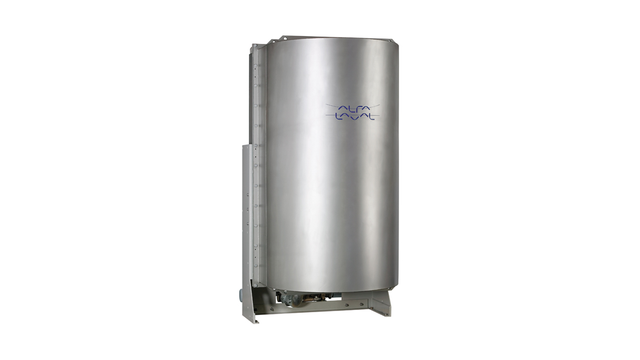DPU-2 - Two stage freshwater generator
Conversion of seawater into freshwater by vacuum distillation for the supply of high quality freshwater for domestic and process utilization. For installation onboard ships, rigs, and onshore remote locations.
PDU, Titanium plate type fresh water generator
Benefits
- High quality freshwater, the low content of dissolved solids (salinity) ensures the supply of pure water that can be used directly as make-up for steam boilers.
- Long lifespan. High-grade corrosion resistant materials, such as the titanium plates, ensure a long lifetime for the equipment.
- Low operation and maintenance costs. Start-and-forget operation, combined with the easy access to the interior, reduces man-hours required for operation and maintenance to a minimum.
- Simple installation due to compact design, low weight and the possibility to assemble on the spot.
DPU, Two-stage titanium plate type fresh water generator
Benefits
- High capacity on waste heat available.
- High quality freshwater, the low content of dissolved solids (salinity) ensures the supply of pure water which can be used directly as make-up for steam boilers.
- Long lifespan, the high grade corrosion resistant materials, i.e. the titanium plates, ensure a long lifespan of the equipment.
- Low operation and maintenance costs. Start-and-forget operation, combined with easy access to the interior, reduces man-hours required for operation and maintenance to a minimum.
- Simple installation due to compact design, low weight and the possibility to assemble on the spot.
Features
DPU, Titanium plate type fresh water generator
- Simple, compact design
- Titanium heat exchanger plates and other seawater resistant materials (non-coated)
- Combined condenser cooling, ejector water and feed water system
- Freshwater control system
DPU, Two-stage titanium plate type fresh water generator
- High energy efficiency
- Simple and compact design
- Titanium plate heat exchangers
- Housing in non coated seawater resistant stainless steel
- Combined condenser cooling, ejector water and feed water system
- Freshwater pump and control system
How it works
DPU, Titanium plate type fresh water generator
Capacity range
The DPU-36-C series covers a capacity range from 10 to 55 m3/24h, depending on the heating medium and cooling water temperatures.
The capacities shown in fig. 1 are capacities at a cooling water temperature of 32°C. The fresh water generator can be dimensioned to suit any jacket water temperature from 55–90°C at any cooling water temperature required.
The quantity of freshwater produced can be altered simply by varying the number of plates in the internal plate heat exchanger.
Working principle
The feed water to be distilled is taken from the sea cooling water outlet of the condenser (1). It enters the evaporator (10) where it evaporates at about 40–60°C as it passes between the plates heated by the heating medium. The evaporating temperature corresponds to a vacuum of 85–95%, maintained by the brine/air ejector (not shown on fig. 2). The vapours generated pass through a demister where any drops of seawater entrained are removed and fall due to gravity to th brine sump at the bottom of the generator chamber. The clean freshwater vapours continue to the condenser (9), where they condense into freshwater as they pass between the cold plates cooled by the sea cooling water.
Installation
The DPU-36-C fresh water generator is designed for automatic operation in periodically unmanned engine rooms and other automated operations.
DPU, Two-stage titanium plate type fresh water generator
Capacity range
The DPU-2-36-C series covers a capacity range from 20 to 75 m3/24h, depending on the heating medium and cooling water temperatures. The capacities shown in fig. 1 are capacities at a cooling water temperature of 32°C. The fresh water generator can be dimensioned to suit any jacket water temperature from 55–90°C at any cooling water temperature required.
The quantity of freshwater produced can be altered simply by varying the number of plates in the internal plate heat exchangers.
Working principle
The feedwater to be distilled is taken from the cooling water outlet of the condenser (13). It enters the evaporator of stage one (11) where some of it evaporates as it passes between the plates heated by the external heating medium. The vapours generated pass through a demister (10) where any drops of seawater entrained are removed and fall due to gravity to the brine sump of stage one and further as feed-water for stage two. The vapours flow through a connecting pipe (15) to the evaporator (12) of stage two where it is utilized as heating medium by transferring its heat to evaporation to the feed-water (brine) coming from the surplus feed of stage one.
The vapours generated in stage two evaporate as in stage one, after the demister (10) the vapours continue to the condenser (13) where they condense into freshwater as they pass between the cold plates cooled by the cooling water.The evaporation processes are performed under vacuum at evaporating temperatures of about 70 and 45°C in the first and second stage respectively. The vacuum is maintained by only one ejector containing three independent stages.
Installation
The DPU-2-36-C two stage fresh water generator is designed for automatic operation in periodically unmanned engine rooms and other automated operations.

